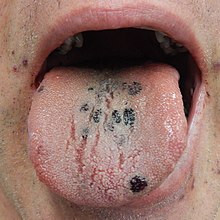Petechia
| Petechia | |
|---|---|
| Other names | Petechiae |
 | |
| Petechiae on the tongue in a person with platelets (platelet count) of 3 G/L (normal: 150–450 G/L) due to ITP | |
| Pronunciation |
|
| Specialty | Rheumatology |
A petechia (
Causes
Physical trauma
The most common cause of petechiae is through physical trauma such as a hard bout of coughing, holding breath, vomiting, or crying, which can result in facial petechiae, especially around the eyes. Excessive scratching and friction, especially on thin and poorly circulated parts of the body may also cause petechiae. Such instances are generally considered harmless and usually disappear within a few days, but depending on severity and frequency may be indicative of an underlying medical condition.
- Constriction, asphyxiation – petechiae, especially in the eyes, may also occur when excessive pressure is applied to tissue (e.g., when a tourniquet is applied to an extremity or with excessive coughing or vomiting).
- Sunburn, childbirth, weightlifting[4]
- Gua Sha, a Chinese treatment that scrapes the skin
- High-G training
- Hickey
- Asphyxiation
- Choking game
- Oral sex[5]
Non-infectious conditions
- Vitamin C deficiency, scurvy[4]
- Vitamin K deficiency[4]
- Leukemia[4]
- Thrombocytopenia – Low platelet counts or diminished platelet function (e.g., as a side effect of medications or during certain infections) can give rise to petechial spots[6]
- clotting factor deficiencies – (Von Willebrand disease)
- Hypocalcemia
- Idiopathic thrombocytopenic purpura
- Coeliac disease
- Aplastic anaemia
- Lupus
- Kwashiorkor or Marasmus – Childhood protein-energy malnutrition
- Erythroblastosis fetalis
- Henoch–Schönlein purpura
- Kawasaki disease
- Schamberg disease
- Ehlers–Danlos syndrome
- Sjögren syndrome – Petechial spots could occur due to vasculitis, an inflammation of the blood vessels. In such a case immediate treatment is needed to prevent permanent damage. Some malignancies can also cause petechiae to appear.
- Radiation
- Fat embolism syndrome
Infectious conditions
- Babesiosis
- Bolivian hemorrhagic fever
- Boutonneuse fever
- Chikungunya
- Cerebral malaria
- Congenital syphilis
- Crimean–Congo hemorrhagic fever
- Cytomegalovirus
- Dengue fever
- Dukes' disease
- Ebola
- Endocarditis
- Influenza A virus subtype H1N1
- Hantavirus
- Infectious mononucleosis
- Marburg virus
- Neisseria meningitidis
- Rocky Mountain spotted fever
- Scarlet fever
- Typhus[7]
- Streptococcal pharyngitis – Petechiae on the soft palate are mainly associated with streptococcal pharyngitis,[8] and as such it is an uncommon but highly specific finding.[9]
Forensic science
Petechiae on the face and
Despite this, petechiae are used by police investigators in determining whether strangulation has been part of an attack. The documentation of the presence of petechiae on a victim can help police investigators prove the case.[11] Petechiae resulting from strangulation can be relatively tiny and light in color to very bright and pronounced. Petechiae may be seen on the face, in the whites of the eyes or on the inside of the eyelids.
See also
References
- ^ a b "Petechia definition and meaning".
- ISBN 978-1-4377-2702-9, retrieved 2022-08-02
- ISBN 978-1-4419-6247-8, retrieved 2022-08-02
- ^ a b c d "Causes". Mayo Clinic.
- PMID 1080847.
- )
- ^ Grayson MD, Charlotte (2006-09-26). "Typhus". MedlinePlus Medical Encyclopedia. National Institutes of Health. Retrieved 2007-11-05.
- ^ Fact Sheet: Tonsillitis from American Academy of Otolaryngology. "Updated 1/11". Retrieved November 2011
- PMID 17137534.
- . Retrieved 2007-09-22.
- ^ "Investigating Domestic Violence Strangulation". BlueSheepdog.com. 2007-11-09. Retrieved 12 May 2011.
